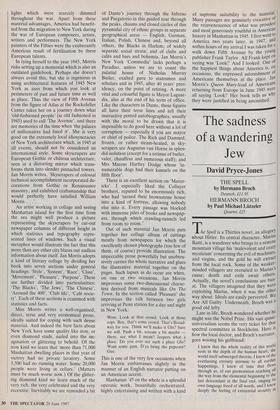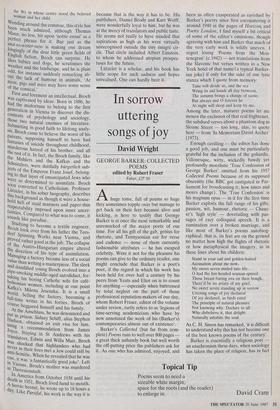The sadness of a wandering Jew
David Pryce-Jones
THE SPELL by Hermann Broch
Deutsch, f11.95
HERMANN BROCH by Paul Michael Liitzeler
Quartet, £25
The Spell is a Thirties novel, an allegory about Hitler. Its central character, Marius Ratti, is a wanderer who brings to a remote mountain village his 'malevolent and crag mysticism' concerning the evil of machines, and virgins, and the gold he will extract from the local rock. Some of the weaker: minded villagers are recruited to Marius 's cause; death and exile await others. Actually, the novel's conclusions are ban- al. The villagers imagined that they were exploiting Marius, when it was the other way about. Ideals are easily perverted. We Are All Guilty. Underneath, Broch was a good old lefty. Late in life, Broch wondered whether he might win the Nobel Prize. His vast quasi- universalism seems the very ticket for that spectral committee in Stockholm. Here is how the local doctor, and Broch's narrator, goes wooing his girlfriend: I knew that the whole reality of this world rests in the depth of the human heart, the world itself submerged therein, I knew of the everlasting eternity intrinsic to all earthly happenings, I knew of time that flows through us, of our premonition reaching all the way from the elemental beginning to the last descendant at the final end, singing Its own language freed of all words, and I knew deeply the feeling of existential security in
the We in whose centre stood the beloved woman and her child.
Wending around the commas, this style has been much admired, although Thomas Mann, no less, hit upon 'noble ennui' as a perfect phrase for it. But just as the und-so-weiter-ness is making one dream longingly of the dear little green fields of English fiction, Broch can surprise. He likes babies and dogs, he scrutinises the weather and the landscape, and he is plain odd, for instance suddenly remarking ab- out the lack of humour in animals, 'At most, pigs and mice may have some sense of the comical.' First and foremost an intellectual, Broch was captivated by ideas. Born in 1886, he had the misfortune to belong to the first generation in Vienna to discover the dis- contents of psychology and sociology, those two natural enemies of literature. Submitting in good faith to lifelong analy- sis, Broch came to believe the worst of his parents, supposing himself to have had fantasies of suicide throughout childhood, murderous hatred of his brother, and all the rest of it. In fact, the Broch family, like the Mahlers and the Kafkas and the Schnitzlers, were dutifully burgerlich sub- jects of the Emperor Franz Josef, belong- ing to that layer of emancipated Jews who were so determined to assimilate. Broch soon converted to Catholicism. Professor Liitzeler, in his sober biography, describes this background as though it were a house- hold hell of staid manners and paper-thin respectability imposed upon inner uncer- tainties. Compared to what was to come, it sounds like paradise.
Studying to become a textile engineer, Broch took over from his father the Tees- dorf Spinning Works near Vienna, and proved rather good at the job. The collapse of the Austro-Hungarian empire altered the direction of his type of assimilation. Managing a factory became less of a social value than writing a masterpiece. The sleek and dandified young Broch evolved into a
Pipe-smoking middle-aged autodidact, for- saking his boring Catholic wife for café- bohemian women, including at one point Kafka's Milena Jesenska. It is a small world. Selling the factory, becoming a full-time writer in his forties, Brach of course beggared himself and his family.
At the Anschluss, he was denounced and Put in prison. Sidney Schiff, alias Stephen Hudson, obtained an exit visa for him,
using a recommendation from James Joyce. Staying in St Andrews with his translators, Edwin and Willa Muir, Broch
Was shocked that highlanders who had never in their lives met a Jew could still be
anti-Semitic. When he revealed that he was one, it was 'a fantastically good joke'. Left in Vienna, Broch's mother was murdered in Theresienstadt. In America from October 1938 until his death in 1951, Broch lived hand to mouth. A heroic hermit, he wrote up to 18 hours a day. Like Parsifal, his work is the way it is
because that is the way it has to be. His publishers, Daniel Brody and Kurt Wolff, were wonderfully loyal to him, but he was at the mercy of translators and public taste. He seems not really to have minded that aspirations as high as his were virtually unrecognised outside the tiny émigré cir- cle. That circle included Albert Einstein, to whom he addressed utopian prospec- tuses for the future.
Liitzeler is a scholar, and his book has little scope for such sadness and hopes unrealised. One can hardly bear it.



























































 Previous page
Previous page